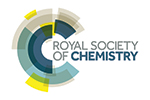We are currently home to 200 undergraduate and 50 postgraduate students and sit within the Department of Chemistry and Forensic Science.
Research within the chemistry department span a diverse range of topics within the key areas of: analytical chemistry, materials chemistry, synthetic chemistry, theoretical and computational chemistry and pedagogy. Our research includes the development of mass spectrometry solutions, biomolecular-materials interfaces, surface science, green chemistry, synthetic organic and inorganic chemistry, theoretical developments and computational chemistry.
Chemistry courses
At undergraduate level, our bioscience courses are your gateway to life as a scientist, and at postgraduate level, you’ll develop specialist knowledge and skills to create your own learning pathway.
Our research
Research Excellence Framework (REF) 2021
In the latest Research Excellence Framework (REF) 2021, 86% of NTU's research impact was assessed to be either world-leading or internationally excellent. The overall quality of each Unit of Assessment NTU submitted to REF in 2021 also saw an improvement from the previous REF in 2014.
Latest news
£1 million funding from Eranda Rothschild Foundation to investigate novel, non-invasive treatment for Alzheimer’s, dementia and Parkinson’s
Mon 23 Sep 2024
Universities’ cold case unit could spark new leads in unsolved missing person cases
Wed 17 Apr 2024
Funding to train next generation of Chemists to take the East Midlands towards net zero
Tue 12 Mar 2024
Nutritionally-enhanced insects could biofortify poultry feed with essential vitamins and minerals
Tue 17 Oct 2023
Scientists monitor the formation of a chemical bond for the first time
Wed 10 Nov 2021
Scientists develop facemask which can kill viruses on contact
Mon 09 Nov 2020
Our events
17
Jul
Senior Leader Apprenticeship (SLA) and Executive MBA Briefing
MS Teams Online Session, MS Teams Online Session,
24
Jul
Fast track your career at Nottingham Business School
04
Sep
Auditory Science Meeting 2025
Nottingham Trent University, Newton Building LT4, Nottingham, United Kingdom,
11
Sep
8th Annual Conference of the Partnership, LLP and LLC Law Forum
Room N31/N38, Newton Building, Nottingham Trent University, Nottingham,
21
Sep
Crafting impactful narratives and outputs on climate and housing in Brazil
Our facilities
We have a range of modern facilities to support both our students and researchers in the Rosalind Franklin Building (RFB), the nearby Interdisciplinary Science and Technology Centre (ISTeC) and in the analytical and microscopy suite.
We have a wide variety of state-of-the-art scientific equipment capable for many experimental methods including: fourier transform infrared spectroscopy, raman spectroscopy, surface characterisation by gas absorption (surface area, pore size distribution etc.) and surface tension and contact angle measurements. We have a selection of potentiostats for electrochemical measurements, one with the capability to perform quartz crystal microbalance (QCM) measurements. For materials analysis we have dynamic light scattering spectroscopy (DLS) and a rotational viscometer.
In addition, available with our microscopy suite are atomic force microscopy (AFM), scanning tunnelling microscopy (STM) and scanning electron microscopy (SEM) equipped with energy dispersive X-ray (EDX) analysis.
Interdisciplinary Science and Technology Centre (ISTeC)
ISTeC is a cutting-edge 13 million facility at NTU, supporting research and majors in Computer Science, Bioscience, Chemistry, and Sport Science.
Rosalind Franklin Building
The Rosalind Franklin Building is home to Chemistry at NTU and armed with the cutting-edge facilities such as our Super Lab.
Interdisciplinary Biomedical Research Facility
Find out about the Interdisciplinary Biomedical Research Facility, our home of biomedical research activities based at Clifton Campus.
Natural Sciences Research Facility
The Natural Sciences Research Facility is home to our research in physics, biosciences, chemistry, imaging, materials and sports performance.

Royal Society of Chemistry